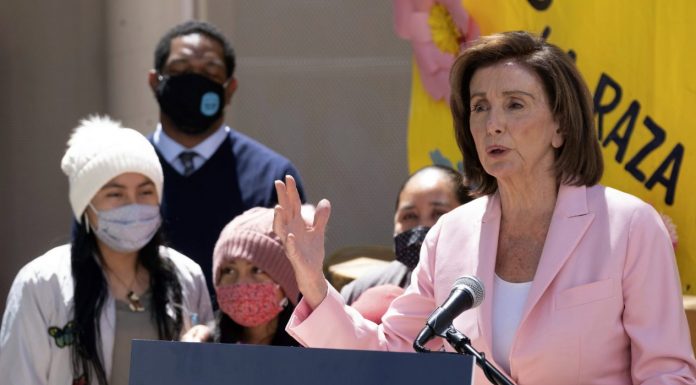(Headline USA) Top Democrats plan House votes next week on a controversial budget resolution that could clear a path for future passage of a massive $3.5 trillion spending spree, shrugging off the pleas from vulnerable party centrists who first wish to pass the Senate’s bipartisan infrastructure bill.
Party radicals wish to handcuff the two bills as a package deal, with the Senate planning to use a procedural ploy to slip the $3.5 trillion in pork through budgetary appropriations, avoiding the need for GOP support.
However, nine House Democrats have threatened to vote against their own party’s budget blueprint—enough to defeat it in the closely divided chamber—if the House doesn’t first approve the separate $1 trillion bill financing highway, water supply and other traditional infrastructure projects supported by Republicans .
In a conference call Tuesday, House leaders made clear that’s not their plan.
Instead, Majority Leader Steny Hoyer, D-Md., said he’d like the chamber to approve the budget resolution next Tuesday, according to a participant in the call who spoke on condition of anonymity.
Leftists hope moving both measures together—rather than quickly approving the infrastructure bill—will pressure moderates to also back the $3.5 trillion package, which they consider too expensive.
The House returns the previous day for what lawmakers hope will be an abbreviated interruption of their August recess.
If all Republicans oppose the budget as expected, Democrats could afford to lose no more than three of their own votes and prevail.
But Hoyer insisted that would-be mavericks put party loyalty ahead of their reservations—be they conscientious objections to the unprecedented cost or concerns about political backlash in the 2022 midterm election.
Unlike their GOP counterparts in the Senate who broke rank to support the infrastructure bill, Democrats tend to operate in a much more monolithic fashion.
“Remember the psychology of consensus,” Hoyer said, according to the person on the call.
“We are in this together,” he continued. ‘We have the leader of our party, and we are pursuing the attainment” of our radical socialist wishlist.
House Speaker Nancy Pelosi, D-Calif., and other leaders used the conference call to reiterate that a final vote on the public works bill would wait until the larger $3.5 trillion measure progresses.
“We must build consensus and Build Back Better with women, fiscal responsibility, with justice,” said Pelosi, using the White House’s name for Biden’s agenda, according to another person on the call who described it on condition of anonymity.
The House plans to vote Monday evening on a procedural measure setting up future debate for the budget resolution, the infrastructure legislation and another Democratic priority restoring federal control over red-state elections via the so-called Voting Rights Act.
The latter was pared down by the Supreme Court in recent years as it determined that the stringent Civil-Rights-era mandates on once segregationist Southern states no longer applied to the modern era.
“All three are critical elements of the president’s agenda, and we hope that every Democratic member supports this effort,” said White House deputy press secretary Andrew Bates.
Hoyer said he also wants the House to approve the voting rights measure on Tuesday and wrap up business. That proposed schedule could pressure moderates to support the budget, since sticking to their planned opposition could extend the House’s stay in Washington until the standoff is resolved.
Some moderates hope the chaotic U.S. flight from Afghanistan might prompt Biden to seek a quick accomplishment by reversing course and asking the House to quickly send him the infrastructure legislation.
“I think more than ever, if the White House would play this smart, they would get a domestic win right now. And that is, bring up the bipartisan infrastructure bill,” Rep. Henry Cuellar, D-Texas, one of the nine unhappy moderates, said in an interview.
Ironically, even leftists who would stand to lose the most from seeing the infrastructure funding fail to pass said they were totally on board with the scheme.
The chairman of the House Transportation and Infrastructure Committee, Rep. Peter DeFazio, D-Ore., supported first tackling the budget and criticized the infrastructure measure because it lacked House input.
In a letter late Monday, DeFazio said Democrats could fix that by rallying behind the budget resolution. He said the budget’s approval would let them put their own infrastructure projects into the separate $3.5 trillion measure, he wrote.
Adapted from reporting by the Associated Press

